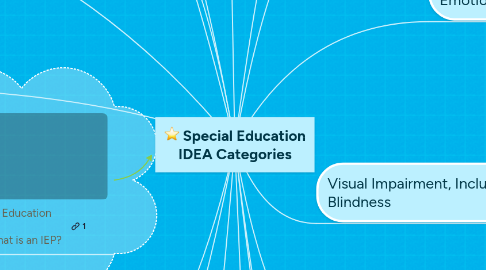
1. Allow extra time to practice new skills and to finish tasks
2. Accommodations for Students who have impaired executive Functioning
2.1. Autism
2.2. ADD/ADHA
2.3. Brain Injury
3. DORE Program
4. Specific Learning Disability
4.1. The skills most often affected are: reading, writing, listening, speaking, reasoning, and doing math
4.2. dyslexia—which refers to difficulties in reading;
4.3. dysgraphia—which refers to difficulties in writing; and
4.4. dyscalcula—which refers to difficulties in math
4.5. Accomodations for Learning Disabilities
4.6. CASE STUDY: Nick
5. Deafness
5.1. Assistive Technology
6. Hearing Impairment
7. Autism
8. Multiple Disabilities
8.1. CASE STUDY: Ellie Specific LD + ADD
9. Traumatic Brain Injury
9.1. Keep classroom routines consistent
9.2. Offer students multiple ways to learn new skills and information
9.3. Communicate with families and other professionals to share information and strategies
9.4. Reduce distractions to help students focus
10. Individual Education Program Video: What is an IEP?
11. Other Health Impairments
11.1. Due to Chronic or acute health problems that adversely affects a child's performance
11.1.1. asthma
11.1.2. ADD/ ADHD
11.1.3. diabetes
11.1.4. epilepsy
11.1.5. heart condition
11.1.6. hemophilia
11.1.7. lead poisoning
11.1.8. leukemia
11.1.9. nephritis
11.1.10. rheumatic fever
11.1.11. sickle cell anemia
11.1.12. Tourette syndrome
11.2. Having limited strength, vitality, or alertness, including a heightened alertness to environmental stimuli, that results in limited alertness with respect to the educational environment
12. Speech or Language Impairment
13. Deaf-Blindness
13.1. Deaf-blindness is the combination of vision and hearing loss, requiring specific instructional strategies that address the presence of both sensory impairments
14. Intellectual Disability
15. Developmental Delay
16. Orthopedic Impairment
16.1. Accomodations
16.1.1. Communicate with families and other professionalls to coordinate care and strategies
16.1.2. Consider medical needs when planning instruction & actitivites
16.1.3. Provide seating and mobility to suit student needs
16.1.4. Think about the essence of the skills you want to teach, identify a multitude of ways students can engage and demonstrate learning
17. Visual Impairment, Including Blindness
17.1. Adaptive P.E. Games
17.2. Assistive Technology
17.2.1. Video Magnifiers
17.2.2. Braille Technology
17.2.3. Optical Character Recognition systems
17.2.4. Speech Systems
17.2.5. Magnification Programs for the Computer Screen
